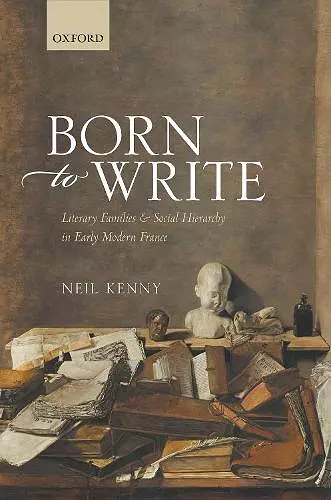Born to Write
Literary Families and Social Hierarchy in Early Modern France
Format:Hardback
Publisher:Oxford University Press
Published:3rd Mar '20
Currently unavailable, and unfortunately no date known when it will be back

It is easy to forget how deeply embedded in social hierarchy was the literature and learning that has come down to us from the early modern European world. From fiction to philosophy, from poetry to history, works of all kinds emerged from and through the social hierarchy that was a fundamental fact of everyday life. Paying attention to it changes how we might understand and interpret the works themselves, whether canonical and familiar or largely forgotten. But a second, related fact is much overlooked too: works also often emanated from families, not just from individuals. Families were driving forces in the production--that is, in the composing, editing, translating, or publishing--of countless works. Relatives collaborated with each other, edited each other, or continued the unfinished works of deceased family members; some imitated or were inspired by the works of long-dead relatives. The reason why this second fact (about families) is connected to the first (about social hierarchy) is that families were in the period a basic social medium through which social status was claimed, maintained, threatened, or lost. So producing literary works was one of the many ways in which families claimed their place in the social world. The process was however often fraught, difficult, or disappointing. If families created works as a form of socio-cultural legacy that might continue to benefit their future members, not all members benefited equally; women sometimes produced or claimed the legacy for themselves, but they were often sidelined from it. Relatives sometimes disagreed bitterly about family history, identity (not least religious), and so about the picture of themselves and their family that they wished to project more widely in society through their written works, whether printed or manuscript. So although family was a fundamental social medium out of which so many works emerged, that process could be conflictual as well as harmonious. The intertwined role of family and social hierarchy within literary production is explored in this book through the case of France, from the late fifteenth to the mid-seventeenth century. Some families are studied here in detail, such as that of the most widely read French poet of the age, Clément Marot. But the extent of this phenomenon is quantified too: some two hundred families are identified as each containing more than one literary producer, and in the case of one family an extraordinary twenty-seven.
In this well-written study of 'literary families' in sixteenth-century France, Neil Kenny (University of Oxford) examines the relationship between 'family literature' and the family members' position on the social ladder....A must-read for literary, historical, and sociological interested readers. * Dick Wursten, Independent Scholar, Antwerp, Belgium, Church History and Religious Culture *
...the wealth of examples that Kenny presents makes a case far more compelling than what arguments from social history alone could have accomplished. With measured prose and in understated tones, Kenny has introduced to literary study a revolution of seismic proportions whose importance and consequences are difficult to overstate. * George Hoffmann, Renaissance and Reformation *
- Winner of CHOICE Outstanding Academic Title 2021.
ISBN: 9780198852391
Dimensions: 236mm x 162mm x 30mm
Weight: 804g
424 pages